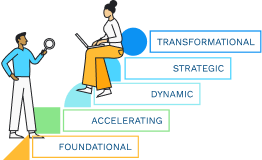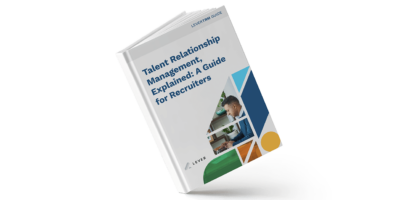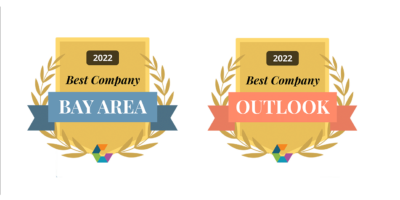As the current year comes to a close, talent acquisition and recruitment teams are planning their strategies for the next 12 months. During this time, hiring teams and HR leaders have to tackle many tasks, including:
- Resolving issues with their recruiting and hiring processes
- Revisiting brand messaging and language in job descriptions
- Revamping their approach to building a diverse workforce
- Reconsidering what the ideal candidate profile looks like
- Reassessing their sourcing and recruitment marketing efforts
Creating a concrete action plan to improve your recruiting process and hiring results is a big, end-of-year priority. But, it’s just as vital for your business to stay on top of the latest talent acquisition trends that will impact your recruitment approach.
Here are five talent acquisition trends you and your leaders should know for 2024.
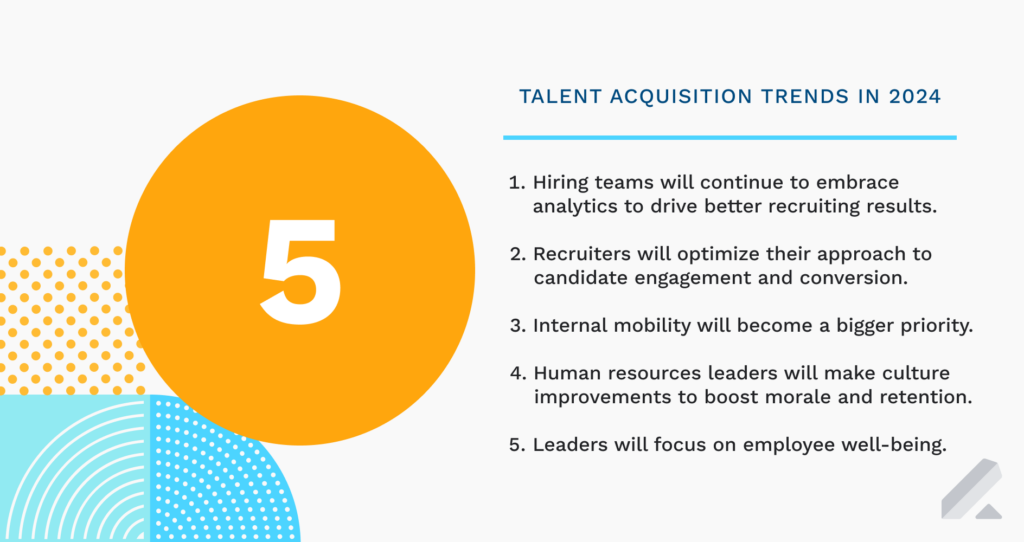
1) Heightened focus on data-driven recruiting and hiring strategies
- Embracing real-time analytics will empower hiring teams to work smarter and faster.
Today’s top HR leaders ensure their recruiters and hiring managers embrace a data-driven approach with technology that enables them to execute results-focused recruiting strategies.
The Employ 2023 Recruiter Nation Report found more HR decision-makers intend to follow suit in 2024. Roughly one-quarter (24%) of HR leaders will invest in analytics and reporting for their hiring teams to help them act on data tied to their recruiting speed and efficiency.
Using best-in-class recruitment software with built-in talent analytics and leveraging data in their decision-making helps hiring teams more effectively recruit open roles — from contract and seasonal workers, to full-time employees — in a scalable, repeatable, efficient way.
Real-time data that shows candidate status and reveals progress on core recruiting metrics, including time to fill, sourcing effectiveness, and offer acceptance, provides hiring teams with actionable insights they can use to improve their work.
Aptitude Research Founder Madeline Laurano recently noted employers must “harness the power of data and insights to chart the right course forward” for their hiring strategies.
Bottom line: Employers that don’t develop data-driven recruiting strategies in 2024 will struggle with hiring top talent, compared to companies that take advantage of analytics.

2) Optimized approach to candidate engagement and conversion
- Building relationships with candidates will be a competitive differentiator for employers.
Whether you’re emailing active job seekers who recently applied for open roles or messaging passive candidates through cold outreach on LinkedIn, you must communicate with these potential hires in a personalized manner to provide a stellar candidate experience.
In 2024, hiring teams will evaluate their talent engagement tactics and overall candidate relationship management strategy to ensure they interact with job seekers in a human way.
Leveraging recruitment marketing automation can help hiring teams nurture both active and passive candidates at scale.
The Employ Recruiter Nation Report found 32% of talent teams will also adopt new candidate engagement scoring frameworks that use artificial intelligence. This is intended to help them quickly learn which messaging resonates with job seekers.
Emailing and texting candidates to update them on their status within the hiring process is essential. Leading recruiting platforms offer automation capabilities that enable hiring teams to put most of these manual tasks on auto-pilot.
Top-rated recruitment technology also provides hiring teams with rules-based workflows that ensure they can send the right message to the right candidates at the right time.
It is up to human resources leaders, however, to ensure their teams are empowered to use purpose-built recruitment software, investing in technology that addresses their hiring complexity and eliminates inefficiencies tied to manual recruiting tasks.
Just remember: The best candidate engagement strategies balance consistency and creativity. Test and optimize your approach regularly using analytics to continually improve key nurture-related metrics, like the open and reply rates for your emails and text messages.
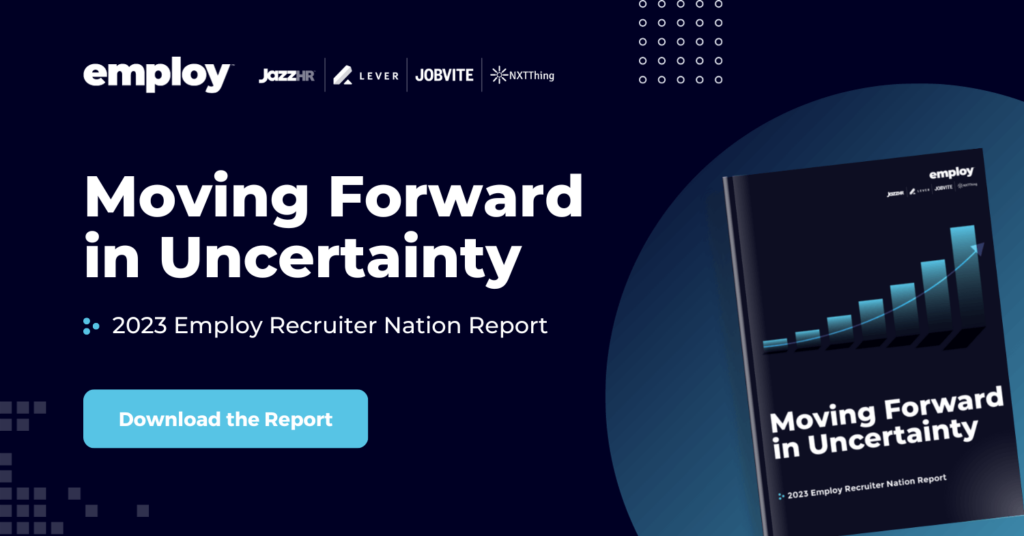
3) Greater emphasis on internal mobility and employee retention
- Businesses that prioritize career mobility will better retain top talent in the coming year.
The Employ Recruiter Nation Report found 39% of employers will focus heavily on internal mobility in 2024. This shows HR decision-makers recognize that, in a competitive job market, it is hard to hire highly qualified candidates, so they must focus on retaining their employees.
And that means helping them advance in their careers internally.
Look for more organizations to offer career pathing to prevent employees from leaving and allow them to move into roles that challenge them and provide new learning opportunities.
This approach not only helps retain employees long term, but also alleviates the pressure on hiring teams. “Businesses need new skills at a rate faster than I’ve ever seen before, which means they need to help their employees evolve via upskilling and internal mobility,” LinkedIn VP of Talent Jennifer Shappley said in the company’s latest Global Talent Trends report.
Whether it’s providing stipends for certifications, offering mentorship programs, or conducting career development training, leaders must offer employees the chance to grow their skill sets and realize their career paths within the organization to boost retention.
While sourcing external talent through job boards, social media, and other channels will remain critical to the success of any talent acquisition strategy, prioritizing internal mobility must become a major focus area in 2024.
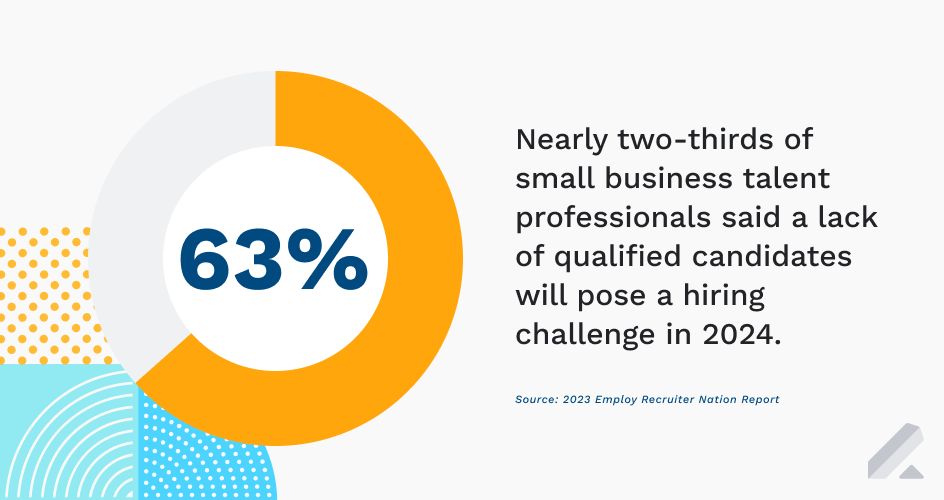
4) Increased reliance on engagement programs to improve company culture
- Human resources will develop more dedicated employee engagement initiatives.
Many companies shifted to a hybrid workforce or entirely remote-work model in recent years. During this transition, many business leaders have evaluated the level of employee engagement for in-office and remote employees.
In 2024, creating a strong culture will be less about making the office a fun environment and more about ensuring employees — whether remote, hybrid, or in-office — feel seen and heard by colleagues and managers, know the value of their work, and are set up to succeed.
Companies that have clearly defined values, create an action plan to keep employees engaged, and improve their diversity, equity, and inclusion efforts will win top talent in a competitive market.
To improve their diversity hiring, the Employ Recruiter Nation Report found employers plan to:
- Showcase their DEI commitment on their career site (44%)
- Write more inclusive job descriptions for job postings (38%)
- Use more diverse interview panels in their hiring efforts (27%)
Along with other recruiting and hiring process changes, these efforts by HR decision-makers and their hiring teams are intended better attract and hire more individuals from underrepresented groups and build a diverse workforce and culture in 2024 and beyond.

5) More efforts to improve employee well-being and work-life balance
- Employee wellness will be a big focus for organizations in 2024, driven by HR leaders.
Workforce burnout and fatigue are prevalent within companies of all sizes today.
To make matters worse, employee well-being was a top areas where business leaders struggled with most amid the pandemic. In 2024, this must be addressed head-on to improve recruitment and retention efforts.
Recruiters have become especially weary. The Employ Recruiter Nation Report found 23% of talent pros experienced high levels of burnout and concerns over their mental health in 2023.
On top of trying to meet hiring goals, recruiters have had to adjust to changes like fully remote interview cycles and staying in sync with team members.
It’s no surprise a focus on mental health and wellness — and being flexible to employees’ needs regarding well-being — is now vital for all companies to thrive today.
“Encourage open communication, active listening, and a non-judgmental atmosphere where employees feel comfortable sharing their concerns, both personal and professional [in 2024],” HR expert Kara Dennison wrote for Forbes. “When employees have psychological safety within work relationships, it can reduce psychological distress and enhance attitude toward work.”
Learn how Lever can transform your talent acquisition strategy in 2024 and beyond. Book a demo today to discover our advanced yet easy-to-use ATS + CRM capabilities.

